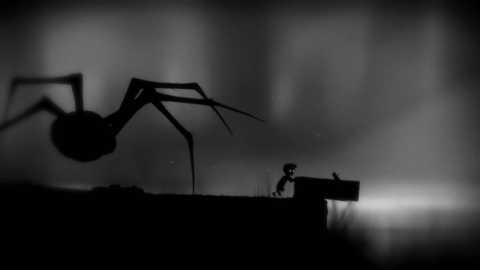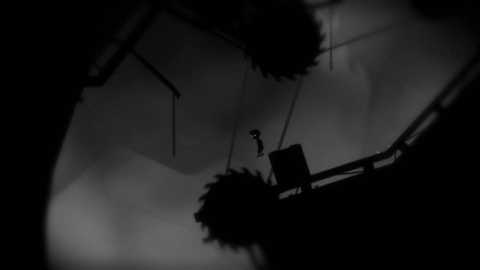
In the simplest terms, Limbo is a side-scrolling action game featuring a little boy looking for his sister in the big spooky forest. I only know that from reading a descriptive blurb somewhere; beyond the menus, the game itself uses no words (written or spoken) to communicate any sort of story. It doesn't even have real music, just a sublimely rendered ambient soundscape. And it doesn't need any of that stuff. You wake up in the woods, and off you go into an increasingly weird, oppressive, sinister dream world. Your sole occupation is to run left to right and try to avoid all the myriad ways this awful wilderness is trying to kill you, and the game focuses all of its efforts on enabling that single objective.
You won't manage to avoid most of those dangers the first time, because so much of Limbo's action centers on brutally immediate, unforgiving environmental hazards. A blade might come swinging out of nowhere and slice you in half, or a gigantic spider could impale you on a wickedly sharp leg almost before you realize it's there. There's really never a moment when you're not in danger of meeting some grisly end or other, and most of those ends you will not see coming. Note however that the timing and triggers in each scenario are the same every time, so getting through the game requires a lot of trial and error, dying to some unforeseen menace two, three, four times before you work out exactly what you need to do and how fast you need to do it to keep yourself alive and continue on.

In case it's not clear already, Limbo is a really hard game, probably too hard for casual players to make it through. But the extreme difficulty is bearable because everything in the game behaves in a very measured, deliberate way, especially the boy himself. He runs, jumps, climbs, and moves objects at a steady and predictable rate that feels really natural when you control him. That makes it easy to gauge timing and distance for your jumps and other moves. And everything in the game obeys a fairly realistic physics model that gives the gameplay a weird sort of tactile feel. Also, there's a checkpoint about every five feet, so you can almost instantly go from dying to retrying the thing you died on. Death is no burden here, just a means to further exploring each obstacle. Taken purely by volume this isn't a long game, but you'll feel like you've gotten plenty out of it by the time you've worked out every puzzle and survived every challenge.

Limbo has a transportive quality that's hard to articulate. It so expertly realizes both its internal gameplay logic and its prevailing aesthetic that it almost creates a sort of reverie as you play, fully removing you from your physical environment and plopping you into this cold, mesmerizing other land. Though you'll find it's a tough place to survive, it might also be one you're in no hurry to leave behind. The game is a masterpiece.